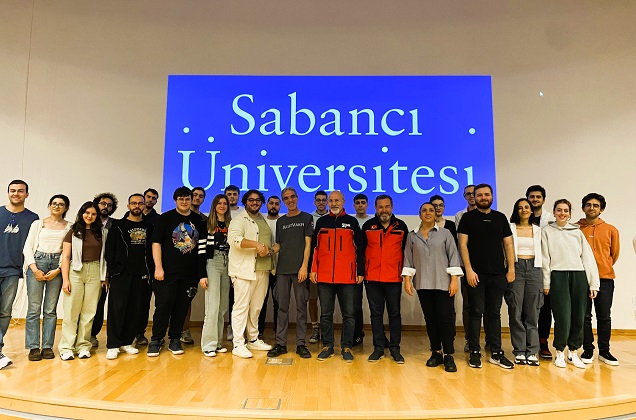10/11/2023
Carrying out many seminars and awareness-raising activities on disaster risk management and response methods after the February 6 Kahramanmaraş earthquakes, our University continues its awareness activities in this field with the Disaster Awareness and Relief Management course launched as of the 2023-24 Academic Year.

In the Disaster Awareness and Relief Management course coordinated by Sabancı Business School, disaster management is taught to students in all its stages. All important topics on the subject such as risk assessment, vulnerability analysis, logistics and resource management, evacuation procedures and personal preparation plans, communication and coordination in disaster relief, psychological aspects, economic burden on society, the role of technology in disaster relief management, and ethical and cultural elements are discussed.
We talked about the course scope and planned studies with Raha Akhavan, who designed and delivers the Disaster Awareness and Relief Management Course, with the coordination support of Ayşegül Toker, member of Sabancı Business School.
gazeteSU: Could we get some information about the Disaster Management course that has started to be offered at our university?
Raha Akhavan: Disaster Awareness & Relief Management course aims to prepare the students both personally and academically and to give a comprehensive understanding of disaster relief management principles and practices. It covers the key terms and concepts related to disaster management, explores various types of disasters and their impacts, and discusses the four phases of disaster management: Mitigation, Preparedness, Response, and Recovery. The course also explores the roles of stakeholders, including government agencies, NGOs, international aid organizations, and communities/volunteers, and emphasizes the importance of collaboration and coordination among them.
One important activity in this course, which is given as an assignment to students, is to prepare a personal preparation plan for immediate protection, evacuation, and reunification with their families in case of a disaster. We have invited Search & Rescue professionals of AKUT Foundation and our own Campus Security to give a workshop on personal preparation, protection and evacuation and then asked the students to develop their personal plans, including kit preparation, studying the evacuation routes and protocols of the campus, and plans to reunify with their families. So by the end of the semester, each student will have a personal preparation plan and a periodic review routine of the plan. We also encourage them to work with their friends and families and help them develop their plans and be ambassadors of disaster awareness and preparedness.
Additionally, the course delves into logistics and resource management in disaster response as well as other important topics such as risk assessment and vulnerability analysis, the ethical and legal considerations that arise in disaster situations, effective communication and coordination among stakeholders, post-disaster economic burden, the role of technology, and the psychological impacts of disasters on individuals and society. We have expert invited speakers from NGOs (AKUT, Sabanci Vakfi), local government (Istanbul Governorship), academia and the commercial logistics sector (Hepsiburada) who have been active in the past disasters. Throughout the course, students will gain an understanding of disasters and the knowledge needed to respond effectively to them, addressing the multifaceted challenges involved in disaster relief management.
To the best of our knowledge, this is the first course of its kind in Turkey. A general course offered to all levels in all undergrad programs. The course in its first offering in Fall 2023 has almost reached its full capacity of 100 enrollments and we plan to offer it at least once a year at SBS.
Which topics are students gaining knowledge about within the scope of the course?
After an introduction to Disaster Relief Management, students delve into various key aspects of the field. These include understanding stakeholders in Disaster Relief Management, the different phases of Disaster Management, risk assessment and vulnerability analysis, logistics and resource management in disaster response, personal response plan and kit preparation, communication and coordination in disaster relief, the role of technology in Disaster Relief Management, ethical and cultural considerations within disaster relief efforts, the psychological impact, and the economic burden on society in the aftermath of a disaster. Furthermore, students will have the opportunity to participate in site visits and engage in a project preparation.
How long is the course?
14 weeks (1 term)
What difference do we expect the course to make in our students' lives in the future?
We expect to equip our students with both professional and personal awareness through our course. On the professional level: Understanding the basic principles and practices of disaster relief management, identifying the stages of disaster management and the key activities associated with each stage, recognizing the roles and responsibilities of different stakeholders in disaster relief efforts, analyzing the ethical and cultural considerations that arise in disaster situations. On the personal level, the students will learn to prepare a personal plan for protection, evacuation and reunification through a hands-on activity supervised by Search & Rescue experts who are collaborating with us in the course (AKUT Foundation and Campus Security). We hope that these students become the ambassadors of disaster awareness and preparedness in society and within their families and communities.




